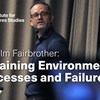meny
Refusing to acknowledge the problem: Interests of the few, implications for the many.
In: G. Sosa-Nunez, & E. Atkins (Eds). E-IR Edited Collections: Environment, climate change and international relations. E-International Relations Publishing. Read more about Edited Collection – Envi
How many refugees can the Swedish welfare state handle?
The past year the influx of refugees has been the topic of many discussions. How will these newcomers affect the people who already live in Sweden? How will they affect the economy, the labour market,
Malcolm Fairbrother: Explaining Environmental Successes and Failures
Venue:Institutet för framtidsstudier, Holländargatan 13, 4th floor, Stockholm, or online. Research seminar with Malcolm Fairbrother, Professor of Sociology, researcher at the Institute for Futures Stud

Malcolm Fairbrother: Explaining Environmental Successes and Failures
Research seminar with Malcolm Fairbrother, Professor of Sociology, researcher at the Institute for Futures Studies. Abstract Why has the world failed so disastrously on climate change? Humanity has su
Hedonism, Desirability and the Incompleteness Objection
Thought, doi.org/10.1002/tht3.410 Abstract Hedonism claims that all and only pleasure is intrinsically good. One worry about Hedonism focuses on the “only” part: Are there not things other than pleasure
Postdoc scholarship at the Institute for Futures Studies in Stockholm
The Institute for Futures Studies and the Swedish Institute, is looking for a highly qualified postdoc to be part of an ambitious interdisciplinary research network, the World Values Survey, based in S
Denial of anthropogenic climate change: Social dominance orientation helps explain the conservative male effect in Brazil and Sweden
Personality and Individual Differences, Volume 98, Pp. 184-187. doi.org/10.1016/j.paid.2016.04.020 Abstract Political conservatives and males are more likely to deny human influence on climate change. In
Transformative Experience and the Shark Problem
Philosophical Studies Abstract In her ground-breaking and highly influential book Transformative Experience, L.A. Paul makes two claims: (1) one cannot evaluate and compare certain experiential outcomes evaluate and compare certain intuitively horrible outcomes (e.g. being eaten alive by sharks) as bad and worse than certain other outcomes even if one cannot grasp what these intuitively horrible outcomes are like. We argue that the conjunction of these two claims leads to an implausible discontinuity in the evaluability of outcomes. One implication of positing such a discontinuity is that evaluative comparisons of outcomes will not be proportionally sensitive to variation in the underlying features of these outcomes. This puts pressure on Paul to abandon either (1) or (2). But (1) is central to her view and (2) is very hard to deny. We call this the Shark Problem.
Right-Wing Populism and Climate Change Denial: The Roles of Exclusionary and Anti-Egalitarian Preferences, Conservative Ideology, and Antiestablishment Attitudes
Analyses of Social Issues and Public Policy Abstract Populist right‐wing politicians and voters tend to dismiss climate change. To investigate possible reasons for this, we tested correlations between c
Science Denial. A Narrative Review and Recommendations for Future Research and Practice
European Psychologist Abstract Science denial has adverse consequences at individual and societal levels and even for the future of our planet. The present article aimed to answer the question: What lea








